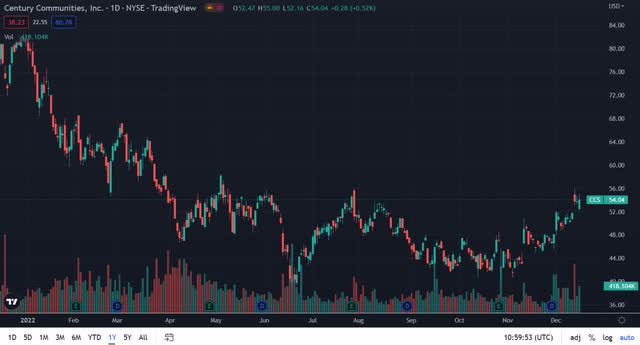SDI Productions/E+ via Getty Images
Century Communities, Inc. (NYSE:CCS) has bounced nicely off its 52-week low of $39.00 per share and has been trading in a range of approximately $41.00 per share to roughly $55.00 per share since about June 20, 2022.
Since December 2021, when the company hit its 2-year high of close to $86.00 per share, the stock has been on a downward trajectory before bottoming out in mid-June 2022, as the housing market slowed down in response to the high interest rate hikes of the Federal Reserve and the resultant increase in mortgage rates.
While the company had some good results in its last earnings report, it downwardly revised its guidance for home delivery, sales revenue, and new community openings.
I’ve been on record for some time now saying the Fed is likely to stop raising rates at around the 5 percent level because of the impact it would have on the amount the Federal government would have to pay on its $31 trillion debt.
For that reason, I believe interest rates will probably top off around the middle of 2023, which would be a catalyst for the housing market. That said, it depends upon the response of CCS to slowing demand that will determine how long it’ll take to ramp things up when housing demand returns to higher levels; in other words, if it significantly reduces its workforce and finds it difficult to build it back up in a tight labor market.
In this article, we’ll look at some of its recent numbers, the changing strategy of the company, and what lies ahead in the next several quarters.
Some of the numbers
Revenue in the third quarter was a company record of $1.1 billion, up 19 percent year-over-year, and beating by $54.97 million. Revenue for the first nine months of 2022 was $3.24 billion, compared to $2.9 billion in revenue in the first nine months of 2021.
Net income in the reporting period was $144.5 million, or $4.44 per diluted share, compared to $114 million in net income, or $3.31 per diluted share in the third quarter of 2021.
For the first nine months of 2022, net income was $446 million or $13.41 per diluted share, compared to $333.5 million, or $9.69 per diluted share in the first nine months of 2021.
EBITDA in the third quarter was 188.7 million, up 16 percent year-over-year. Gross margin in the reporting period was 24.8 percent.
The company delivered 2,630 homes in the quarter, up 13 percent from last year in the third quarter. It had 1,318 net new home contracts in the quarter, with a backlog of 3,455 homes with a value of approximately $1.4 billion. The new contracts were significantly down from the 2,742 new contracts in the third quarter of 2021.
Including cash held in escrow, the company had $182 million in cash and cash equivalents at the end of the quarter, with total debt of $1.38 billion.
How the housing market is shaping up
As mentioned above, the decline in net new contracts fell to less than half of what they were in the third quarter of 2021, with weakness across all the regions that CCS operates in. This is attributed to rising mortgage rates and ongoing economic uncertainty.
Management sees demographics remaining favorable for housing and believe as rates stabilize buyers will come back to the market once they adjust to the new mortgage rates and higher costs.
At this time, the company said that homebuyers in the current market are looking for homes that are near completion in order to lock in lower mortgage rates before the Fed boost interest rates again.
Consequently, sales have been under pressure because the company doesn’t have a lot of home inventory that is close to being completed or ready to be moved into. With that in mind, the company is now focusing on marketing the homes it does have that are near completion, and not increasing starts that will only build up its backlog further.
While the company has generally not been reducing base prices in its existing communities, it has been offering various incentives to close on homes when opening in new communities; things such as “mortgage rate buydowns, rate locks, and discounts on options and upgrades,” which has produced positive results in getting buyers to sign contracts.
Although gross margin was solid in the third quarter, the company is looking at contraction in the first half of 2023 as it increases incentives to potential buyers. Assuming the Fed does top off its interest rate hikes sometime in the first half of 2023, the company expects gross margin to return to normal levels in the second half of 2023.
In response to current economic conditions and the housing market in general, CCS decided to build homes that are more affordable, which have lower input costs and wider margins. That suggests it’s likely targeting a younger demographic of first-time buyers, rather than current homeowners that are looking to move up.
About 80 percent of its sales in the third quarter came from homes priced under FHA limits.
With the focus on low-cost homes and contracting margins, I think the company will probably see its revenue in earnings drop over the next two to three quarters until the housing market stabilizes from a more favorable mortgage rate environment.
As for the financial quality of buyers, in its Century Communities unit FICO scores were 736 on average, while in its Century Complete unit the average FICO score was 709, based on loans originated by its mortgage company in the third quarter.
Cancellation rates in the third quarter jumped to 35 percent as a result of higher mortgage rates and economic uncertainties. I think those numbers are probably going to climb in the next two to three quarters.
On the existing home side of the housing market, that’s likely to remain under pressure because homeowners aren’t likely to walk away from very low mortgage rates to those that are far higher.
Concerning input costs, specifically lumber and trusses, but also almost every other category as well, have dropped in the third quarter. Management believes that will continue because of the lower number of housing starts which will ease up the supply chain.
At the end of the reporting period the company had 63,000 owned or controlled lots, down from the 76,000 at the end of the second quarter of 2022. Approximately 55 percent of the lots are owned, with the remaining 45 percent controlled.
With many lots remaining at high price levels, CCS has started walking away from more of them which will result in lower spend on land.
Based upon the housing market slowdown, the company lowered its home delivery guidance to a range of 10,000 to 10,500 homes for full year 2022, and for home sales revenue it lowered guidance to $4.2 billion to $4.4 billion for full year 2022.
Conclusion
I think the third quarter results were an outlier that isn’t likely to be repeated for at least the next two quarters, and probably three.
It’s difficult to know how to view the share price potential of the company because it has already fallen from about $85.00 per share in early 2021 to about $54.00 per share as I write, bouncing off its 52-week low.
More than likely the bounce came from some of the record numbers in the third quarter, but from a technical standpoint, Century Communities, Inc. is facing a triple-top of around $55.50 per share, and may have gotten ahead of itself in light of the challenges it faces in 2023.
But even if it breaks out above that price level, I’m not seeing any positive catalysts that would provide support for that for a prolonged period of time.
For investors thinking the housing market is going to improve in the second half of 2023, I would wait to take a position in CCS because it’s not offering a good risk/reward opportunity at this time. More than likely the next couple of quarters will reflect the slowdown more, and after the record third-quarter numbers, the share price should retreat.
In the months ahead, it looks like the slowdown will continue as the Federal Reserve will likely raise interest rates for several more months, probably topping off at around 5 percent, and possibly slightly higher. That, of course, will increase mortgage rates in a time when the recession continues on or goes much deeper. Under that scenario, the stock will take a big hit and probably test its 52-week low.
At this time, even with the good numbers from the last quarter, the negatives in the housing market and the potential impact on the share price of CCS in the near term makes Century Communities, Inc. a stock to be cautious with until we see consumer response to higher mortgage rates and depending on whether or not the recession is going to go on for longer and deeper than expected.



Be the first to comment